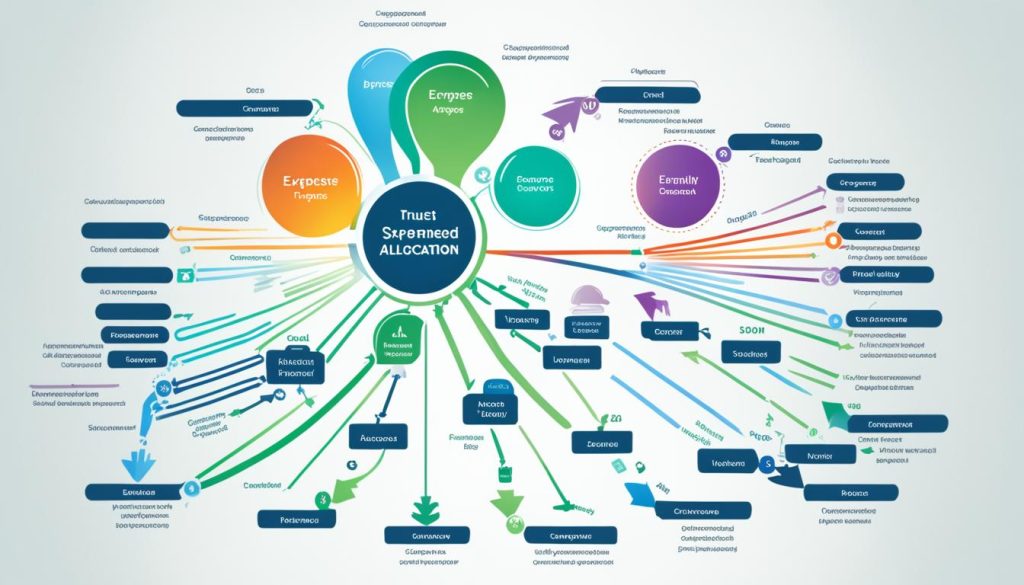Managing finances efficiently is a critical aspect of nonprofit organizations’ success. With limited resources and complex funding structures, nonprofits need robust accounting solutions to streamline their financial operations. QuickBooks, a trusted name in accounting software, offers tailored features designed specifically for nonprofit organizations. Let’s explore how QuickBooks revolutionizes financial management for nonprofits and enhances their mission-driven work.
Key Takeaways:
- QuickBooks provides specialized features and tools to meet the unique accounting needs of nonprofit organizations.
- Features such as fund segmentation, customizable chart of accounts, and donation and grant tracking enable nonprofits to accurately track and manage funds.
- Expense allocation, budgeting, and comprehensive financial reporting capabilities help nonprofits improve transparency, accountability, and decision-making.
- By incorporating QuickBooks into their financial management processes, nonprofits can streamline operations, boost efficiency, and ensure compliance with donor restrictions.
- QuickBooks offers both desktop and online versions, providing flexibility and accessibility for nonprofits of all sizes.
Fund Segmentation for Clear Financial Records
When it comes to managing finances, nonprofit organizations face unique challenges. They often have various income sources and restricted or designated donations that need to be tracked separately. Keeping clear financial records becomes essential to ensure transparency and accountability.
QuickBooks, the versatile accounting software, offers a solution to this challenge through fund segmentation. With QuickBooks, nonprofit organizations can set up separate accounts for each fund they have, allowing for precise tracking and reporting of financial activities.
By utilizing fund segmentation in QuickBooks, nonprofits can easily allocate income and expenses to specific funds, ensuring transparent and accurate financial records. This not only helps organizations monitor their financial performance but also makes it easier to comply with donor restrictions and demonstrate accountability to stakeholders.
Here’s an example of how fund segmentation works:
| Fund | Income | Expenses |
|---|---|---|
| General Fund | $50,000 | $30,000 |
| Program Fund A | $20,000 | $15,000 |
| Program Fund B | $15,000 | $10,000 |
Table: Example of Fund Segmentation in QuickBooks
As shown in the table above, each fund has its own income and expense records, allowing nonprofits to track the financial activities related to specific programs or initiatives easily.
By leveraging QuickBooks’ fund segmentation feature, nonprofit organizations can streamline their financial operations, maintain accurate records, and gain valuable insights into the performance of individual funds or programs. This empowers them to make informed decisions and effectively communicate their financial well-being to stakeholders.
Next, let’s explore how QuickBooks provides customizable chart of accounts that meet the unique needs of nonprofit organizations.
Customizable Chart of Accounts for Nonprofit Needs
One of the key features that sets QuickBooks apart as an ideal accounting software for nonprofit organizations is its ability to provide a customizable chart of accounts. This feature allows nonprofits to tailor their chart of accounts to meet their unique needs and requirements, ensuring accurate tracking and categorization of income and expenses.
QuickBooks offers the flexibility to create separate accounts for general funds, restricted funds, and program-specific funds, enabling nonprofits to easily differentiate between different sources of income and allocate expenses accordingly. By customizing their chart of accounts, organizations can improve their financial reporting and analysis, providing stakeholders with clear and transparent insights into their financial health.
Benefits of a Customizable Chart of Accounts
When nonprofit organizations can customize their chart of accounts, it offers several key advantages:
- Accurate Tracking: Nonprofits can accurately track and categorize their income and expenses based on their specific funding sources and programs. This level of detail allows for more accurate financial reporting and analysis, ensuring transparency and accountability.
- Improved Financial Reporting: By tailoring the chart of accounts to their unique needs, nonprofits can generate comprehensive financial reports that provide a clear overview of their financial performance by fund, program, or category. This helps stakeholders better understand the organization’s financial health and make informed decisions.
- Easier Compliance: Nonprofit organizations often have to comply with donor restrictions and reporting requirements. A customizable chart of accounts makes it easier to allocate funds and expenses in accordance with these restrictions, simplifying compliance and enhancing transparency.
- Efficient Audit Trails: With a customizable chart of accounts, nonprofits can maintain a comprehensive audit trail that ensures every transaction is accurately recorded and can be traced back to its source. This level of accountability is essential for nonprofit organizations, especially during audits or financial reviews.
Example Chart of Accounts for Nonprofit Organizations
Here’s an example of how a customizable chart of accounts for nonprofit organizations in QuickBooks might look:
| Account | Description |
|---|---|
| 1000 | General Fund |
| 1100 | Donations |
| 1200 | Grants |
| 2000 | Restricted Funds |
| 2100 | Fundraising Events |
| 2200 | Donor-Restricted Grants |
| 3000 | Program-Specific Funds |
| 3100 | Education Programs |
| 3200 | Community Outreach |
This is just a basic example, and nonprofits can customize their chart of accounts further to align with their specific programs, initiatives, and reporting needs. Having a customizable chart of accounts allows nonprofits to have a clear and organized financial structure that supports effective financial management and decision-making.
Customizable accounts for nonprofit organizations in QuickBooks provide the necessary flexibility and precision to meet the unique financial management requirements of nonprofits. By tailoring their chart of accounts, nonprofits can better track their income and expenses, improve financial reporting, and ensure compliance with donor restrictions. With QuickBooks, managing the finances of a nonprofit organization becomes more efficient and accurate, allowing organizations to focus on their mission and make a greater impact on their communities.
Efficient Donation and Grant Tracking
In order for nonprofit organizations to effectively manage their funds, it is crucial to have a reliable system for tracking donations and grants. QuickBooks provides a seamless solution for recording and monitoring these important financial transactions.
QuickBooks donation tracking allows nonprofits to accurately document each donation received, specifying the intended fund or program it is associated with. This level of detail ensures that funds are allocated according to donor intentions, promoting transparency and accountability.
With grant tracking for nonprofits, organizations can easily keep track of grant disbursements and the funds they are designated for. This feature helps nonprofits stay organized and ensures that grant money is used in accordance with the terms set by the grantor.
By utilizing QuickBooks’ donation and grant tracking capabilities, nonprofits can efficiently monitor the flow of funds, maintain compliance with donor restrictions, and provide accurate financial reports to stakeholders. This level of financial transparency instills confidence in donors and ensures that funds are used efficiently and effectively.
Here is an example of how donation and grant tracking can be implemented in QuickBooks:
| Date | Description | Fund/Program | Amount |
|---|---|---|---|
| 01/15/2023 | Individual Donation | General Fund | $500 |
| 02/02/2023 | Grant from XYZ Foundation | Education Program | $10,000 |
| 03/10/2023 | Corporate Donation | Community Outreach Program | $2,500 |
With this comprehensive tracking system, nonprofits can easily determine the total amount of donations and grants received for each fund or program. This information can then be used to generate accurate financial reports and facilitate informed decision-making.
Overall, efficient donation and grant tracking with QuickBooks provides nonprofits with the tools they need to manage their funds effectively, maintain compliance, and demonstrate their financial integrity to stakeholders.
Accurate Expense Allocation for Program and Fund Reporting
One of the key features of QuickBooks for nonprofit organizations is its ability to facilitate accurate expense allocation for program and fund reporting. By allocating expenses to specific funds or programs, nonprofits can track the costs associated with each initiative and generate detailed financial reports. This level of granularity enables organizations to monitor the financial performance of their programs and funds, make informed decisions, and demonstrate accountability to stakeholders.
With QuickBooks, nonprofits can easily assign expenses to the appropriate fund or program, ensuring that the financial data is accurately recorded and reported. By categorizing expenses in this way, organizations gain valuable insights into which programs or funds consume the most resources and whether they align with the organization’s goals and objectives.
For example, a nonprofit may have multiple programs or funds, such as education initiatives, healthcare services, or community development projects. By allocating expenses to each program or fund in QuickBooks, the organization can evaluate the effectiveness and efficiency of each initiative. This information can then be used to make data-driven decisions, reallocate resources, or adjust program strategies to better achieve the organization’s mission.
Furthermore, accurate expense allocation in QuickBooks enables nonprofits to generate detailed financial reports that provide a comprehensive overview of their programs and funds. These reports can include information such as total expenses, expenses by program or fund, and expense ratios for each initiative. Such insights can be crucial for demonstrating financial stewardship to donors, grantors, and other stakeholders.
With the ability to allocate expenses accurately in QuickBooks, nonprofits can optimize their financial management and reporting processes. By having a clear understanding of how resources are allocated across programs and funds, organizations can enhance their transparency and accountability. This, in turn, can help build trust and confidence among supporters and stakeholders.
The Benefits of QuickBooks Expense Allocation and Program-Specific Reporting
- Accurate tracking of expenses for each program or fund
- Insights into the cost effectiveness and efficiency of different initiatives
- Data-driven decision-making based on program performance
- Detailed financial reporting for transparency and accountability
- Enhanced trust and confidence among stakeholders
QuickBooks provides nonprofit organizations with powerful tools for expense allocation and program-specific reporting. By leveraging these features, nonprofits can gain a deeper understanding of their financial performance and make informed decisions to drive organizational success.

With accurate expense allocation in QuickBooks, nonprofits can allocate costs to specific programs or funds, enabling detailed financial reporting and analysis. This level of transparency and accountability is vital for demonstrating the impact and stewardship of nonprofit organizations.
Effective Budgeting for Fund Performance Analysis
One of the crucial aspects of financial management for nonprofit organizations is effective budgeting. QuickBooks provides nonprofits with powerful budgeting features that enable them to track their funds and analyze their performance. By setting up budgets for each fund in QuickBooks, organizations can compare actual income and expenses against the budgeted amounts, allowing for comprehensive fund performance analysis and informed decision-making.
With QuickBooks budgeting for nonprofits, organizations can foster financial stewardship by closely monitoring their funds’ performance and ensuring that they operate within the allocated budgets. This helps identify areas where adjustments are needed, enabling nonprofits to allocate their resources effectively and maximize the impact of their programs and initiatives.
By leveraging budget tracking with QuickBooks, nonprofits can gain valuable insights into their financial health and make data-driven decisions. The ability to analyze fund performance against budgets empowers organizations to identify trends, evaluate the effectiveness of their revenue streams and expense management, and optimize their financial strategies.
QuickBooks’ budget tracking feature also enhances transparency and accountability by providing a clear overview of how funds are being utilized. Nonprofits can demonstrate their financial stewardship to stakeholders, including donors, grantors, and board members, by presenting accurate budget comparisons that showcase their prudent fiscal management.
“Effective budgeting in QuickBooks allows nonprofits to align their financial goals with their mission. By tracking fund performance and analyzing budget variances, organizations can make informed decisions, optimize resource allocation, and achieve greater financial sustainability.” – Jane Smith, Financial Manager at XYZ Nonprofit
Benefits of QuickBooks Budgeting for Nonprofits:
- Facilitates fund performance analysis and informed decision-making
- Enhances financial stewardship and resource optimization
- Improves transparency and accountability to stakeholders
- Enables evaluation of revenue streams and expense management
- Supports effective financial planning and budget allocation

Real-Time Budgeting and Fund Performance Analysis
One of the key advantages of using QuickBooks for budgeting in nonprofits is the ability to access real-time data. QuickBooks provides accurate and up-to-date financial information, allowing organizations to monitor their fund performance in real-time. This real-time visibility into budget variances and financial trends empowers nonprofits to proactively manage their finances and make timely adjustments if needed.
With QuickBooks’ fund performance analysis capabilities, nonprofits can conduct thorough evaluations of their programs, initiatives, and overall financial health. By comparing actual results with budgeted amounts, organizations can identify areas for improvement, address potential issues, and ensure that funds are allocated optimally to achieve their mission-driven objectives.
By utilizing QuickBooks for budget tracking, nonprofit organizations can enhance their financial planning, optimize resource allocation, and achieve greater efficiency and impact. QuickBooks’ comprehensive tools and features empower nonprofits to manage their funds effectively, sustainably, and transparently, enabling them to make a positive difference in their communities.
Comprehensive Financial Reporting for Transparency and Accountability
QuickBooks provides nonprofit organizations with robust financial reporting capabilities, enabling them to generate detailed reports that offer transparency and bolster accountability. With QuickBooks, nonprofits can easily produce fund-specific financial statements and reports, empowering them to clearly communicate their financial performance to stakeholders.
Financial reports play a crucial role in demonstrating transparency and accountability, as they provide an overview of an organization’s financial health and how funds are allocated and utilized. By utilizing QuickBooks’ financial reporting features, nonprofits can meet reporting requirements, provide clear financial information to donors and grantors, and ensure compliance with regulatory standards.
Effortless Fund-Specific Reports
Generating fund-specific reports in QuickBooks is simple and efficient. Nonprofits can easily filter the financial data by fund, enabling them to create reports that focus on specific funds or programs. This allows nonprofits to showcase the financial performance of each fund individually, offering a comprehensive view of their financial operations.
The ability to generate fund-specific reports allows nonprofits to provide detailed insights into the financial health of individual programs or projects. This level of granularity enables stakeholders to understand how funds are allocated, spent, and the impact they have on the organization’s mission and goals.
Enhancing Transparency and Accountability
“Financial reporting is essential for nonprofits to maintain transparency and accountability. By utilizing QuickBooks’ comprehensive reporting capabilities, organizations can showcase their financial performance, instill trust in stakeholders, and promote effective decision-making.” – Jane Smith, Financial Manager at XYZ Nonprofit Organization
Transparent financial reporting is crucial for nonprofits to build trust with donors, grantors, and other stakeholders. QuickBooks facilitates the production of accurate and meaningful financial statements that convey an organization’s financial stability and responsible use of funds. By providing clear and detailed financial information, nonprofits can demonstrate their commitment to transparency and accountability.
QuickBooks also offers customizable report templates, allowing nonprofits to tailor the appearance of their financial statements to align with their branding and communication style. This ensures consistency in their reporting materials and enhances the professionalism and credibility of the organization.
Meeting Reporting Requirements and Ensuring Compliance
Nonprofit organizations often have specific reporting requirements that need to be fulfilled. QuickBooks provides a range of pre-built financial reports that cater to nonprofit needs, ensuring compliance with industry standards and regulations. These reports include income statements, balance sheets, statement of cash flows, and more, all of which can be generated with ease in QuickBooks.
Additionally, nonprofits can customize their financial reports in QuickBooks to include specific metrics and key performance indicators (KPIs) that align with their organizational goals. This enables nonprofits to track their financial performance against targets and benchmarks, empowering them to make data-driven decisions and evaluate their effectiveness.
Example of QuickBooks Financial Reports
| Report Type | Description |
|---|---|
| Income Statement | Shows the revenue, expenses, and net income for a specific period, allowing nonprofits to assess their financial performance. |
| Balance Sheet | Presents the organization’s assets, liabilities, and equity, providing a snapshot of its financial position at a specific point in time. |
| Statement of Cash Flows | Outlines the organization’s cash inflows and outflows, providing insights into its liquidity and cash management. |
| Fund-Specific Reports | Highlights the financial performance and position of individual funds or programs, offering detailed information on income, expenses, and net assets. |
These financial reports empower nonprofits to assess their financial health, identify areas for improvement, and communicate their impact to stakeholders. By leveraging QuickBooks’ comprehensive financial reporting capabilities, nonprofits can uphold transparency and accountability, paving the way for continued growth and success.
Conclusion
QuickBooks revolutionizes financial management for nonprofit organizations by simplifying accounting processes and streamlining financial operations. With its robust features, such as fund segmentation, customizable chart of accounts, donation and grant tracking, expense allocation, budgeting, and financial reporting, QuickBooks provides nonprofits with the tools they need for effective financial management.
By incorporating QuickBooks into their financial practices, nonprofits can boost efficiency, ensure compliance, and make data-driven decisions. The fund segmentation feature allows for clear financial records, while the customizable chart of accounts caters to the unique needs of nonprofit organizations. Donation and grant tracking ensures accuracy in fund allocation, and expense allocation enables program and fund reporting.
QuickBooks’ budgeting feature enhances fund performance analysis, and its comprehensive financial reporting capabilities promote transparency and accountability. By utilizing QuickBooks, nonprofits can enhance their transparency, accountability, and ultimately, their impact.
FAQ
How does QuickBooks revolutionize financial management for nonprofit organizations?
What is fund segmentation and why is it important for nonprofit organizations?
How does QuickBooks provide a customizable chart of accounts for nonprofit needs?
How does QuickBooks enable efficient donation and grant tracking?
How does QuickBooks facilitate accurate expense allocation for program and fund reporting?
How does QuickBooks support effective budgeting for fund performance analysis?
How does QuickBooks provide comprehensive financial reporting for transparency and accountability?
What are the benefits of using QuickBooks for nonprofit organizations?
Source Links
- https://www.linkedin.com/pulse/quickbooks-nonprofit-fund-accounting-bilal-ahmed-3avnf
- https://www.nonprofitexpert.com/introduction-nonprofit-accounting/
- https://www.goodstewardfinancialco.com/maximizing-nonprofit-efficiency-unveiling-the-benefits-of-quickbooks/
